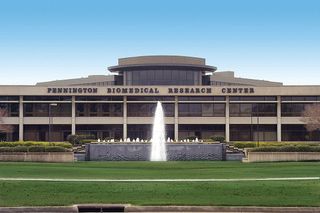BATON ROUGE - The Louisiana Clinical & Translational Science Center has been awarded a $1.3 million grant to support the efforts of in-state healthcare institutions to share health data for research purposes.
The funds will be split between two LA CaTS members, Pennington Biomedical and Tulane University school of medicine. Together, these two projects will strengthen the LA CaTS Center’s capacity to address health care disparities, supporting community-specific research as well as fostering greater patient engagement through a tailored approach to health care.
“This grant to LA CaTS will enhance our ability to pursue research requiring large clinical databases,” said Dr. John Kirwan, Executive Director of Pennington Biomedical and Director for LA CaTS. “The Information Age is allowing scientists and researchers, like those of the LA CaTS participant members, to analyze large-scale data like never before. In doing so, they are discovering patterns and observing trends in all sorts of diseases that were once impossible to see. This Baton Rouge area collaboration will result in Louisiana-based researchers generating new studies to pursue improved health outcomes for our residents.”
Projects planned by Pennington Biomedical include the creation of a clinical data warehouse for secure storing and linkage of health data from healthcare providers in Baton Rouge to the Louisiana Tumor Registry. These warehouses will enable Baton Rouge providers and researchers to efficiently assemble data required for large-scale data projects, as well as for projects toward rare conditions.
“Pennington Biomedical researchers actively collaborate with Baton Rouge area providers. This network of data warehouses is intended to make such collaborations more numerous and enable more projects directed toward specific Baton Rouge health issues. Using such a network to achieve depth of coverage across a large geographic area is innovative,” said Dr. Ronald Horswell, Associate Professor of Research - Population and Public Health at Pennington Biomedical. “Pennington Biomedical investigators have collaborated with researchers from these Baton Rouge-based healthcare partners for years, and this collaborative strengthens our ability to solve even more complex health problems.”
The data warehouses will be named the Baton Rouge Health District Research Data Collaborative. The first planned research project to utilize this network of warehouses will include data from the Louisiana Tumor Registry.
“Coalition building among our regional health and life science institutions for the betterment of community health is central to the Baton Rouge Health District,” said Steven Ceulemans, Executive Director of the Baton Rouge Health District. “I can think of no better example of this synergy than by uniting Pennington Biomedical’s world-class research strengths with the clinical expertise and information within our regional medical centers through this data collaborative.”
Tulane is using their grant to administer a project that would finance the development of an application that clinicians can use to support their patient-specific Type 2 diabetes goals.
“At Tulane University, we are excited about the opportunity to implement a clinician-facing application which will enable clinicians and patients to jointly establish patient-specific optimal diabetes control goals,” said Dr. Fonseca, Section Chief of Endocrinology at Tulane University Health Sciences Center. “These projects will greatly enhance the LA CaTS Center’s ability to address health care disparities and will set a precedent for use of FHIR-based applications for purposes of precision medicine and fostering greater patient engagement.”
LA CaTS is a collaboration of 10 research and health care provider organizations, committed to addressing health disparities and improving health outcomes for those with chronic diseases in Louisiana’s underserved populations. It serves as a clinical translational science center for Louisiana, fostering collaboration among major academic and biomedical research institutions in the state.
Across both projects, the use of large-scale data and the latest in technological advances greatly grows the LA CaTS Center’s capacity to address health care disparities. The data warehouse will make it feasible for the Center to expand data accessibility to smaller, rural providers, and the app developed at Tulane will apply FHIR for precision medicine and greater patient engagement.
